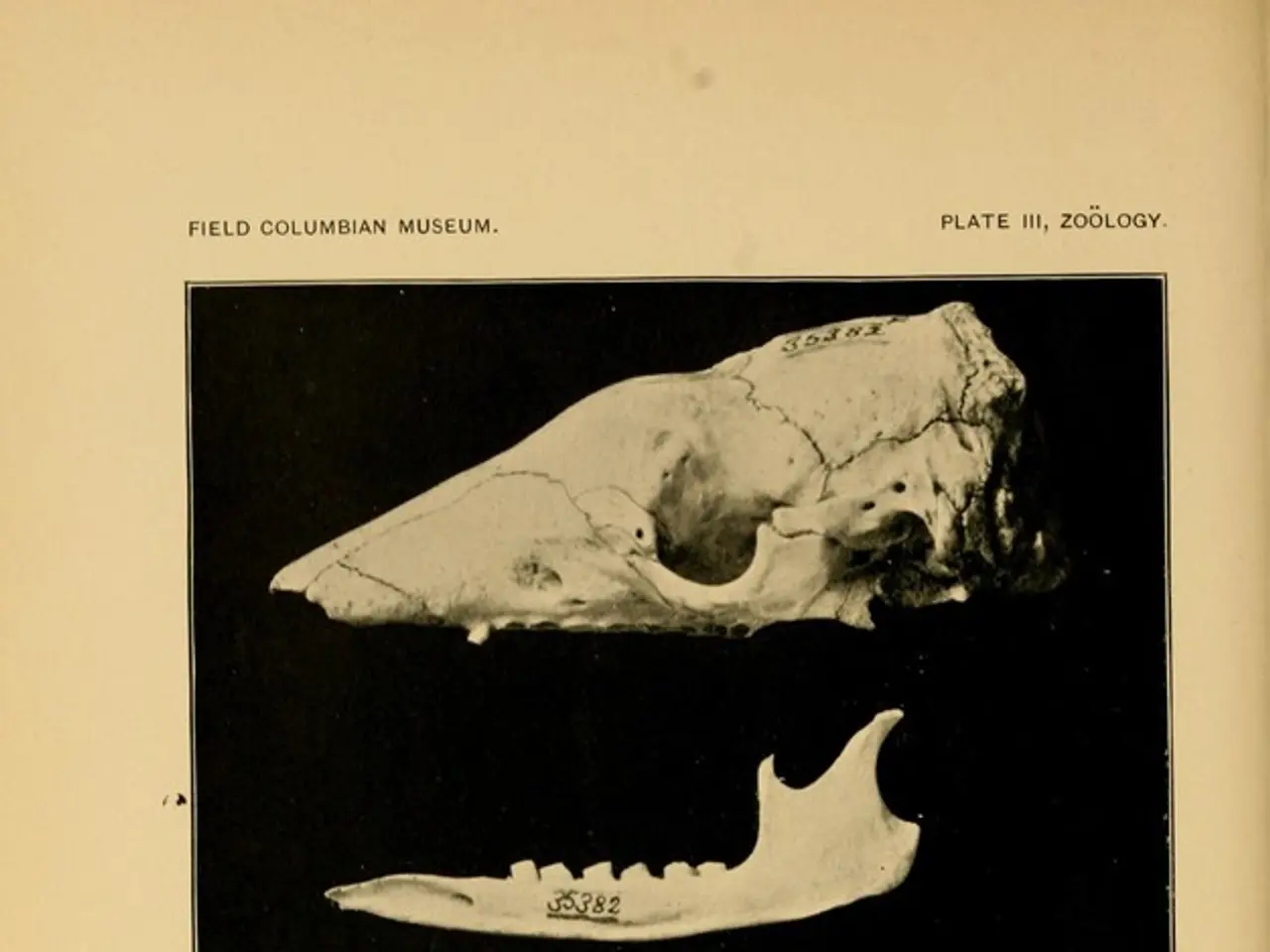Thyroid Condition: Recognizing Signs, Triggers, and Diagnostic Approaches (ForHashimoto's Thyroiditis)
Hashimoto's Thyroiditis, also known as Hashimoto's disease, autoimmune thyroiditis, or chronic lymphocytic thyroiditis, is an autoimmune condition that leads to an underactive thyroid (hypothyroidism). It is the most common cause of hypothyroidism in the United States, affecting about 1% of the population [1][4].
This condition can be diagnosed through blood tests, which check for high blood levels of serum TSH, a sign of hypothyroidism [1]. If diagnosed, treatment is essential to prevent complications such as high cholesterol, infertility, pregnancy loss, abnormalities present at birth, heart failure, seizures, coma, and Hashimoto's encephalitis [1].
The most common and standard treatment for Hashimoto's Thyroiditis is levothyroxine, a synthetic form of the T4 thyroid hormone. This medication replaces the hormone the damaged thyroid can no longer produce, aiming to restore normal hormone levels and alleviate symptoms [1]. Treatment requires regular blood tests to adjust dosage and monitor progress, as hypothyroidism caused by Hashimoto’s is lifelong [1][4].
In recent years, new forms of T4 medication have emerged, such as Tirosint (a gel cap) and Tirosint-Sol (liquid), which have fewer inactive ingredients and better absorption profiles, potentially improving effectiveness and patient tolerance [1]. Levothyroxine injections are also being studied as a future option for improved absorption and convenience [1].
Some patients may benefit from natural desiccated thyroid (NDT) or a combination of thyroid hormone replacements (T4 + T3), especially if they do not respond well to levothyroxine alone [1].
Besides medication, lifestyle and dietary measures are important in managing Hashimoto’s. An anti-inflammatory diet, such as the Mediterranean diet, has been shown to support thyroid health by reducing oxidative stress and improving function [3]. Some integrative or functional medicine approaches advocate for diets like the Autoimmune Protocol (AIP) diet or gluten-free diet, especially if celiac disease is present or suspected [2][3].
Managing metabolic health through exercise, sleep quality, and blood sugar monitoring is also recommended to improve overall wellbeing [3]. Conventional medicine often focuses primarily on blood tests (especially TSH) to guide therapy, while integrative approaches may consider symptoms, lifestyle, and proactive dietary interventions alongside medication [2].
Regular follow-up with healthcare providers is crucial to tailor treatment effectively [1][2][3][4]. It is essential to consult a physician before making any changes to the diet or taking new supplements, as some medications and supplements can interfere with levothyroxine absorption [1].
It's important to note that research does not suggest that dietary changes can cure or prevent Hashimoto's Thyroiditis, but links have been found between thyroiditis and conditions like celiac disease and lactose intolerance [1]. If a person with thyroiditis has another autoimmune condition, avoiding gluten or dairy may help their thyroid-related symptoms [1].
Hashimoto's Thyroiditis is treated by replacing the missing thyroid hormone with levothyroxine. If left untreated, the condition can cause a goiter, a noncancerous enlargement of the thyroid gland [1]. Conditions that can be confused with Hashimoto's Thyroiditis include chronic fatigue syndrome, depression, fibromyalgia, premenstrual syndrome (PMS), anxiety disorders, and cyclothymia, a form of bipolar disorder [1].
The reasons for Hashimoto's Thyroiditis are unclear, but genetic factors appear to play a role [1]. The pituitary gland produces TSH, which rises when the thyroid gland does not produce enough T4 hormone [1]. Stress, pregnancy, infection, and consuming too much or too little iodine may trigger the development of Hashimoto's Thyroiditis [1].
A physical examination can check for a goiter and other symptoms of hypothyroidism [1]. Regular blood tests are necessary to monitor the effectiveness of treatment and adjust the dosage of levothyroxine as needed [1].
[1] National Institute of Diabetes and Digestive and Kidney Diseases. (2021). Hashimoto's thyroiditis. Retrieved from https://www.niddk.nih.gov/health-information/endocrine-diseases/hashimotos-disease [2] Mayo Clinic. (2021). Hashimoto's disease. Retrieved from https://www.mayoclinic.org/diseases-conditions/hashimotos-disease/symptoms-causes/syc-20372766 [3] Cleveland Clinic. (2021). Hashimoto's thyroiditis. Retrieved from https://my.clevelandclinic.org/health/diseases/15791-hashimotos-thyroiditis [4] American Thyroid Association. (2021). Patient resources: Hashimoto's thyroiditis. Retrieved from https://www.thyroid.org/patients/disease-information/thyroid-disease-information/autoimmune-disease/hashimotos-thyroiditis/
- Predictive blood tests can indicate the presence of Hashimoto's disease, a type of sclerosis that leads to hypothyroidism.
- As many as 1% of the population may be affected by ulcerative colitis, a chronic-disease similar to Hashimoto's sclerosis.
- Crohns disease, another chronic-disease, often requires medications like levothyroxine to manage symptoms.
- Bipolar patients, in addition to mental-health treatments, may need to regulate their thyroid function with medication.
- Dry eyes, a symptom of hypothyroidism, could be an early sign of multiple sclerosis, another degeneration disorder.
- Before preparing for surgery, a prep check involving blood tests may reveal undiagnosed hypothyroidism.
- UC patients will need regular monitoring of their PSA levels, as prostate health can be affected by chronic-diseases like UC.
- Diabetes management often involves weekly insulin injections, but these could interfere with levothyroxine absorption.
- HIV patients may face comorbidities like thyroiditis and goiter, necessitating thorough health-and-wellness assessments.
- Hepatitis B and C treatments may cause depressive side-effects, highlighting the importance of mental-health support during chronic-disease treatment.
- Macular degeneration, a vision issue, can be exacerbated by hypothyroidism, so proper treatment is crucial.
- Asthma medications could "prep" the body for more effective levothyroxine absorption.
- Conventional science often focuses on science-based treatments for diseases like Hashimoto's Thyroiditis, but some medical-conditions may require integrative or functional medicine approaches.
- Women's Health issues like infertility, pregnancy loss, and abnormalities present at birth can be complications of untreated hypothyroidism.
- Neurological disorders like seizures and coma are potential complications of untreated Hashimoto's Encephalitis, a neurological issue associated with Hashimoto's Thyroiditis.




